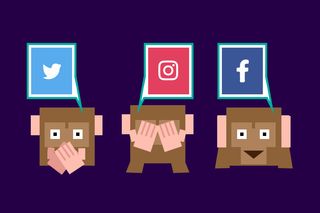
The Thing that Drew Me to Social Media Also Led Me to Quit It
Two months ago, I was deep in the throes of a supposedly philosophical discussion about the simultaneous usefulness and futility of Instagram, about how the platform has turned into a marketplace to display our exc...

Two months ago, I was deep in the throes of a supposedly philosophical discussion about the simultaneous usefulness and futility of Instagram, about how the platform has turned into a marketplace to display our excesses, when I had an epiphany.
I’d been through this sequence of events so many times before — opening Instagram, scrolling on till I found something that I thought was utterly ridiculous, snapshotting it, sharing it with a group of friends, popping over to WhatsApp to discuss, giggle, and mock said post. But that day, despite having initiated the conversation, I was suddenly overcome with disgust at how judgmental I was being, and about someone who was essentially a stranger.
It wasn’t the people I follow. It wasn’t the amount of effort I put into pruning my feed.
It was me.
***
Ranting about the evils and downside of technology and social media is a recurring pattern. Hating social media even as we continue to exist on all platforms and master the trendy tricks of judgmental snark (legitimised by hashtags like #sorrynotsorry), is so normal.
Why the compulsion to look through people’s lives, believe everything is a lie, rip through their posts and poke holes in their beliefs? I consider myself largely self-assured, content and confident. But on an off-day, when I am low, dissatisfied or even just bored, I’d sometimes catch myself looking at every post in a very different light. Pictures of perfect gym-bodies contorting in ways I will never manage to, plates of perfectly cooked, balanced meals that I don’t have the inclination to put together, people going on holiday after holiday, immaculately curated homes, beautifully articulate opinions and thoughts, gorgeous clothes worn with casual ease, effortless and unselfconscious selfies – I’d slip into a gnawing sense that my life is perhaps not all that good enough. That it is somewhat lacking in one way or another.
That the app is preying and manipulating this insecurity is no secret. In this recent article in The Globe and Mail, Matt Mayberry of Dopamine Labs says the app withholds notifications and releases them in a staggered fashion, to keep users compulsively coming back for more.
“They’re tying in to your greatest insecurities,” Mayberry says.
Sean Parker, ex-president of Facebook, recently confirmed that the site was made to exploit human vulnerability, by creating a social-validation feedback loop that gives users a hit of dopamine with every notification. Ultimately, the success of an app is in how much it is used. In this Guardian article, which draws a bleak picture of the future as a smartphone dystopia, Chris Marcellino (one of the architects of iPhone’s push notification feature) reveals smartphone technology aims to tap into the same neurological pathways that influence gambling and drug use.
According to a 2015 study by British psychologists, quoted in the article in The Globe and Mail, “Average users look at their phones about 150 times a day,…and about twice as often as they think they do…These companies have persuaded us to give over so much of our lives by exploiting a handful of human frailties. One of them is called novelty bias. It means our brains are suckers for the new.”
It also means our brains are suckers for donning a thick judgmental attitude. Social media makes you feel like a star, but actually keeps you in the audience, where your only worth is your response. It forces you to react. To take a stance, pick a side. To create a chatter. To decide — at once — if you like or dislike something. If you love or hate it. If it was pretty, or not. If it was realistic, or not.
Could it be that we’ve confused exhibitionism for vulnerability and strength? Was I swapping staying in touch for staying up to date? Had the quest for self-improvement and been replaced by self-validation?
In this alarming think piece, Andrew Sullivan writes about how technology, social media (and by extension, capitalism) are diminishing the place and value of real connections, community and the experience of being with and around people. Similarly, it is extinguishing the deep contentment and satisfaction that comes from the workmanship and tedium essential for human growth, by making everything accessible, instant and efficient.
“By rapidly substituting virtual reality for reality, we are diminishing the scope of this interaction even as we multiply the number of people with whom we interact…We reduce them to some outlines — a Facebook ‘friend,’ an Instagram photo, a text message — in a controlled and sequestered world that exists largely free of the sudden eruptions or encumbrances of actual human interaction. We become each other’s ‘contacts,’ efficient shadows of ourselves,” he writes.
The resulting despair seems to be a theme of our time. It is coupled with an inability to stay with anything we begin to pursue, whether a relationship or a hobby. The ability to watch everything from a distance, retaining the right to dip in and out, dispensing judgment without every really getting involved, has petered into the very way in which we live life. And in the end, it has contributed to the nameless restlessness and angst, fragile and fraught relationships and widespread boredom that washes over my generation. We scroll, mindless, with casual and helpless nonchalance, even as we know the damage it is doing to us.
***
Within seconds of ending that conversation, I had deactivated my Instagram account. Facebook and Twitter followed the day after. One month later, I introduced a 10-hour WhatsApp-free window to my day.
Off the grid, plenty of life’s answers come slowly. They’re not usually packaged in neat little bytes of information that one can simply, thoughtlessly scroll through. They require marinating in experience, immersing ourselves in the tedium of routine, reveling in the smallness of everyday life.
Stepping away from an immediate, judgmental and curated kind of existence has helped turn down the chatter in my head, making me acutely aware that what I am seeking is authenticity. And what I need the most right now, is to satisfy the basic human needs – to seek joy in experiences, find connection in relationships; to listen to the voice within, not the chorus without; to act, not react. So much of this requires me to just put my phone down and get out – physically, mentally and emotionally.
It might be the platform. It might be a whole generation. But, at the end of it all –
It’s me.
Revati Upadhya lives between Bangalore and Goa and writes on food, travel, culture, women's issues and lifestyle.
Related


Longer Parental Leave Linked to Better School Performance
